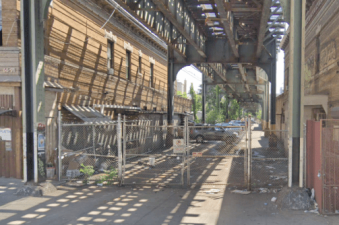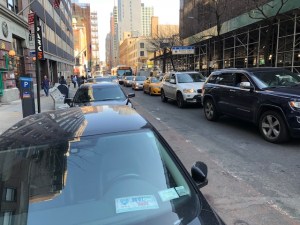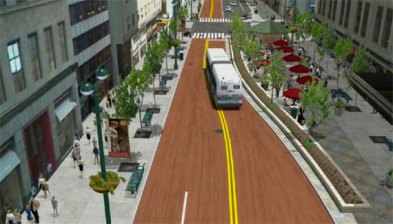MTA Plans Busway Beneath the M Train in Ridgewood
The MTA is working on a plan for a short busway in Ridgewood that would run for six-tenths of a mile beneath the elevated M tracks, between Fresh Pond Road and Palmetto Street. While the project wouldn’t transform a car-choked traffic sewer into a pedestrian-friendly transit boulevard (the right-of-way is currently a series of weed-strewn parking lots), it could be NYC’s first new separated busway since the Fulton Mall opened in the 1970s.

The busway would have one lane in each direction and three bus stops. (Overhead, the M train stops at Fresh Pond Road, Forest Avenue, and Seneca Avenue.)
In its recently-released 20-Year Capital Needs Assessment [PDF], the MTA said the busway, which leads directly to the Fresh Pond bus depot, “will reduce travel times and reduce operating costs for several bus routes.” The MTA says the project would save approximately $1 million in operating costs annually.
Buses currently running east-west in the area are the Q58, B13, and B20, which carry a combined 41,428 passengers on an average weekday. Slightly more than two-thirds of that ridership is on the Q58.
Engineering and planning firm Parsons Brinckerhoff performed a conceptual engineering study for the busway in 2012. The project, included in the regional transportation funding plan approved last month by the New York Metropolitan Transportation Council [PDF], would be funded by $11.64 million from the federal Congestion Mitigation and Air Quality Improvement program and $2.91 million in matching funds from the MTA scheduled for Fiscal Year 2015. The total project cost is between $12.5 and $19 million; the MTA says the cost has not been finalized and that it has not yet made a decision on whether to proceed with the project.
New York has no bus routes where cars can’t intrude and slow down transit riders. A DOT plan to build a separated busway on 34th Street was scuttled in 2011, resulting in a more modest plan to improve the M34 SBS route. The MTA has proposed a busway along an elevated railroad track on Staten Island’s north shore, but the Ridgewood project looks like it could be up and running first. While it won’t set a precedent for carving a separated busway out of car lanes, it would help show how quickly, smoothly, and reliably buses can run when traffic doesn’t get in the way.




